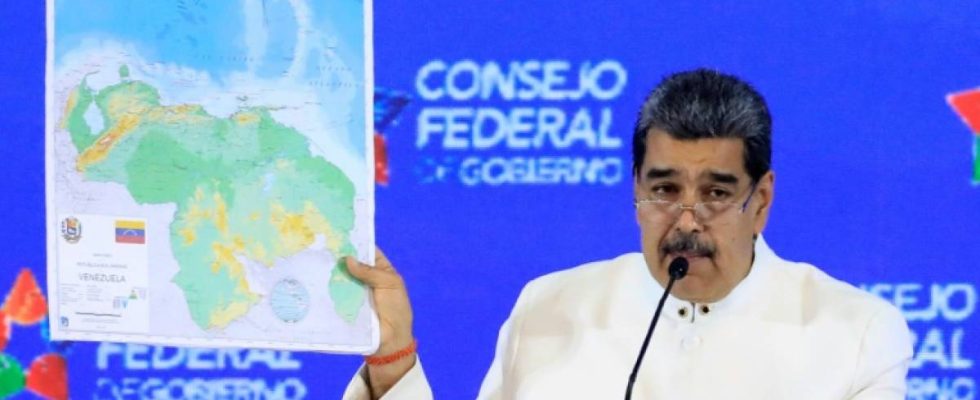Venezuelan President Nicolas Maduro shows a map of the country that includes the area claimed in Guyana, during an event at the presidential palace in Miraflores, December 5, 2023 (Venezuelan Presidency / ZURIMAR CAMPOS)
The United States announced Thursday air military exercises in Guyana in the midst of a crisis over its Essequibo region, an oil-rich territory claimed by Venezuela and which will be the subject of a closed-door meeting on Friday. UN Security Council.
The UN is thus responding to a request from Guyanese Foreign Minister Hugh Todd who requested an emergency meeting on this region under Guyanese administration but claimed by Venezuela.
The UN Security Council will address this crisis on Friday, according to the updated program published Thursday by the United Nations.
The United States, for its part, announced in a press release that it was carrying out “air operations” in Guyana on Thursday “in collaboration with the country’s defense forces”.
“This exercise is part of routine engagements and operations aimed at strengthening the security partnership between the United States and Guyana,” the document from the US Embassy in Guyana added.
Earlier, US Secretary of State Antony Blinken affirmed his “unwavering support for Guyana’s sovereignty”.
Aerial view of the Potaro River, located in the Potaro-Siparuni region of Guyana on April 12, 2023 (AFP / Martín SILVA)
Faced with escalating tensions in the region, Brazilian President Luiz Inacio Lula da Silva said Thursday that he did not want a “war in South America.” “We do not need a conflict, we must build peace,” he insisted.
Adding to the tension, a Guyanese military helicopter with seven people on board was reported missing Wednesday near the border with Venezuela.
On Thursday, the Guyanese army announced that it had found him and detected “signs of life” at the crash site. Troops were sent to the site about 50 km from the border with Venezuela in a “mountainous and dense forest” area.
Guyanese Chief of Staff Omar Khan said on Wednesday that he had “no information” on the fate of the aircraft, suggesting “a Venezuelan intervention”. However, he specified that the weather conditions were “bad”.
The United States is an ally of Guyana, and the American group ExxonMobil is one of the main oil operators in this small country destined to become an Eldorado of black gold with the largest reserves per capita on the planet, notably thanks to the discoveries recent in Essequibo.
– Communication channels –
Caracas has for decades claimed this territory of 160,000 km2 representing more than two thirds of Guyana and where 125,000 people live, or a fifth of the country’s population. Caracas has become more pressing since the discovery of significant oil reserves by ExxonMobil in 2015.
The two countries, however, renewed contact on Wednesday with a telephone call between the Ministers of Foreign Affairs, Hugh Todd and the Venezuelan Yvan Gil, “to discuss the question of the territorial dispute”, according to a Venezuelan press release.
The two countries “agreed to keep communication channels open,” according to the text. This rapprochement occurred after bitter exchanges.
Caracas has accused Guyanese President Irfaan Ali of having “irresponsibly” given the “green light” to the installation of American military bases in Essequibo.
At the same time, Venezuelan President Nicolas Maduro advocated the creation of a special military zone near the border and ordered state giant PDVSA to grant oil exploitation licenses in the Essequibo.
President Irfaan Ali responded by speaking of “a direct threat to the territorial integrity, sovereignty and political independence of Guyana”. He stressed that his army was on “full alert” and accused Venezuela of being an “outlaw nation” and “a significant risk to peace and security.”
Map of the Essequibo territory, disputed between Venezuela and Guyana, locating the areas claimed by each country (AFP / Guillermo RIVAS PACHECO)
For Mariano de Alba of the International Crisis Group, “the rhetoric of confrontation will continue” but an “armed conflict is unlikely”.
Venezuela organized a referendum on Essequibo on Sunday to give more weight and credibility to its demands. According to official figures – contested by many observers – some 10.4 million Venezuelan voters participated in the consultation and 95% of them said they were in favor of the integration of Essequibo into the country.
Venezuela maintains that the Essequibo River should be the natural border, as in 1777 during the time of the Spanish Empire. Guyana, for its part, argues that the border dates from the English colonial era and was ratified in 1899 by an arbitration court created ex nihilo for the case in Paris.

